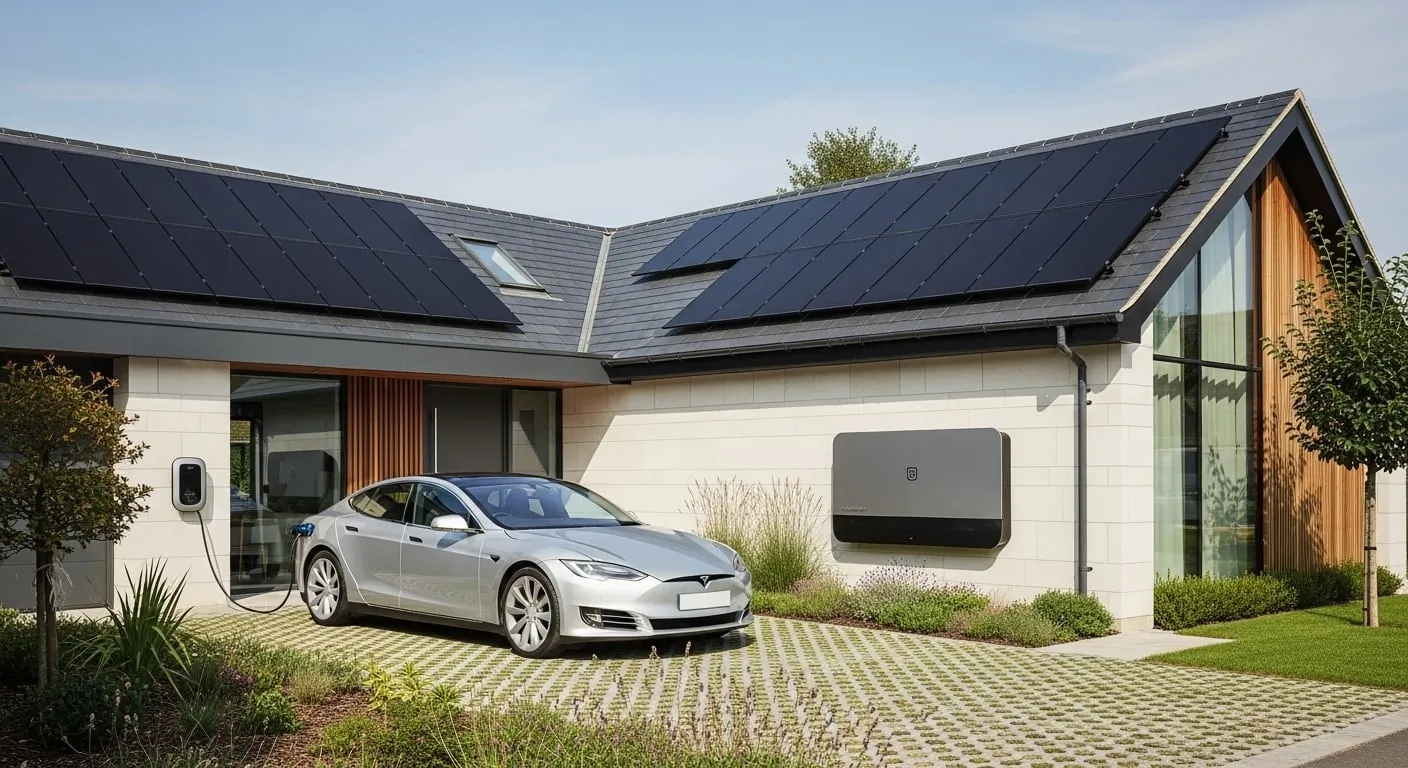
Solar Panel Cost Calculator UK (2026)
Get an instant, realistic price estimate for solar panels and battery storage
What will solar panels really cost for my home?
Use our solar panel cost calculator to get an instant, realistic price estimate for solar panels and battery storage in the UK.
You can see a rough system cost immediately, without entering any personal details.
If you want more detail, you can optionally download a 12-page personalised solar report with deeper cost and savings breakdowns.
How does the solar panel cost calculator work?
Our calculator uses a small number of key inputs to generate a tailored estimate for your home.
You'll be asked for:
- Your electricity usage or bill
- Your current electricity price
- Whether you want battery storage
- Basic property details such as location and roof orientation
Using this information, the calculator estimates:
- The recommended solar system size
- Estimated installation cost
- Expected energy generation
- Indicative annual savings
- Estimated break-even period
All estimates are based on UK daylight data, average panel efficiency, roof direction, and your local conditions.
Can I get a solar price estimate without entering my details?
Yes. You can view a rough solar panel and battery cost estimate instantly, with no email address, phone number, or personal details required.
If you'd like more detail, you can choose to enter your details to download a full personalised solar information booklet. This step is optional.
What's included in the full solar report?
If you choose to continue, the downloadable report includes:
- A detailed system recommendation
- Cost and savings breakdown
- Estimated annual generation
- Payback period explanation
- Information on 0% VAT and the Smart Export Guarantee (SEG)
- Clear next steps if you want a formal quote
There's no obligation to proceed.
How much do solar panels cost in the UK?
The cost of solar panels depends on system size, roof type, and whether you add battery storage.
Typical UK prices:
- 4kW solar system (average home): £5,000–£6,000 installed
- Solar + battery system: £13,000–£15,500 depending on battery size
Most homes use 8–12 panels, with total costs influenced by panel efficiency, installation complexity, and available roof space.
Finance options are available to help spread the cost.
How much can I save with solar panels?
Savings depend on your energy usage, system size, and whether you add a battery.
Typical UK savings:
- Annual savings: £440–£1,005
- Payback period: 7–9 years for most homes
Examples:
- Smaller homes (1–2 bedrooms): ~6 panels (2.1kW), saving ~£270 per year
- Larger homes (3–4 bedrooms): 10–14 panels, saving £450–£630 per year
Battery storage can increase savings by allowing you to use more of your own solar energy.
Are there government incentives for solar panels?
Yes. UK homeowners may benefit from:
- 0% VAT on solar panel installations until 2027
- Smart Export Guarantee (SEG) payments for exporting excess electricity
- ECO4 / HUG2 grants for eligible low-income households
- Green or interest-free loans from selected lenders
Eligibility depends on your property and circumstances.
What affects the cost and performance of solar panels?
Several factors influence both price and output:
- System size
- Roof orientation and shading
- Panel efficiency
- Installation complexity
- Location and daylight hours
The calculator accounts for these factors to give a realistic estimate rather than a generic figure.
How long does solar panel installation take?
For most homes:
- Installation takes one day
- Planning permission is usually not required
- Systems are tested and connected on the same day
- Panels are low-maintenance with 25–30 year warranties
Can I add batteries or upgrades later?
Yes. Optional upgrades include:
- Solar battery storage
- Bird protection
- Hot water diverters
- Remote system monitoring
These can be included in your estimate or added later.
Why use an online solar calculator first?
Using a calculator lets you:
- Understand likely costs before speaking to an installer
- Check whether solar makes sense for your home
- Avoid unnecessary site visits
- Get clear pricing expectations early
It's a simple way to make an informed decision.
How do I get started?
Use the calculator
Get an instant estimate with no details required
Download the full report
Optional — get a 12-page personalised solar booklet
Arrange a site survey
Get a fixed quote from our MCS certified team
Installation
Typically completed within 4 weeks
Frequently Asked Questions About Solar Panels & Costs
Ready to see your solar panel cost?
Get an instant estimate with no details required. Try the solar and battery cost calculator now.